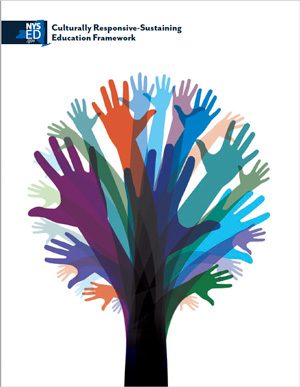Posted:

For more than a century, education providers throughout the United States have strived and struggled to meet the diverse needs of American children and families. A complex system of biases and structural inequities is at play, deeply rooted in our country’s history, culture, and institutions. This system of inequity — which routinely confers advantage and disadvantage based on linguistic background, gender, skin color, and other characteristics — must be clearly understood, directly challenged, and fundamentally transformed. The New York State Education Department (NYSED) has come to understand that the results we seek for all our children can never be fully achieved without incorporating an equity and inclusion lens in every facet of our work (see also New York State’s Every Student Succeeds Act (ESSA) Plan). This understanding has created an urgency around promoting equitable opportunities that help all children thrive. New York State understands that the responsibility of education is not only to prevent the exclusion of historically silenced, erased, and disenfranchised groups, but also to assist in the promotion and perpetuation of cultures, languages and ways of knowing that have been devalued, suppressed, and imperiled by years of educational, social, political, economic neglect and other forms of oppression.
In January 2018, the New York State Board of Regents directed the Office of P-12 Education and Higher Education to convene a panel of experts, engage with stakeholders, and develop from the ground up a framework for culturally responsive-sustaining education. The New York University Metropolitan Center for Research on Equity and the Transformation of Schools, under the leadership of Dr. David Kirkland, drafted a robust guidance document that served as a springboard for this initiative. The New York State Education Department presented this guidance document to students, teachers, parents, school and district leaders, higher education faculty, community advocates, and policymakers. The guidelines in this document represent the collective insight of this work.
The Culturally Responsive-Sustaining (CR-S) framework is intended to help education stakeholders create student-centered learning environments that affirm cultural identities; foster positive academic outcomes; develop students’ abilities to connect across lines of difference; elevate historically marginalized voices; empower students as agents of social change; and contribute to individual student engagement, learning, growth, and achievement through the cultivation of critical thinking. The framework was designed to support education stakeholders in developing and implementing policies that educate all students effectively and equitably, as well as provide appropriate supports and services to promote positive student outcomes.
Historically, education debates have been polarized, with difference sometimes being viewed as an individual deficit. The CR-S Framework marks our journey forward and begins the evolution toward leveraging difference as an asset. The framework is grounded in four principles*:
- Welcoming and Affirming Environment
- High Expectations and Rigorous Instruction
- Inclusive Curriculum and Assessment
- Ongoing Professional Learning
Each principle is illustrated by a set of features rooted in elements of quality education that illustrate how CR-S might look in practice across a range of domains, from the State Education Department to the classroom. The framework represents an opportunity for stakeholders to continue to work together and plan for the unique needs of their communities.
The New York State Education Department recognizes much of this work is already happening across the state and looks forward to an even deeper understanding of culturally responsive-sustaining education in New York State schools, districts, and communities. This framework reflects the State’s commitment to improving learning results for all students by creating well-developed, culturally responsive-sustaining, equitable systems of support for achieving dramatic gains in student outcomes.
* The 4 principles that organize State Education Department’s CR-S Framework were inspired by the 4 high leverage strategies that emerged from Buffalo Public School’s work on Culturally and Linguistically Responsive Education.
- Log in to post comments
